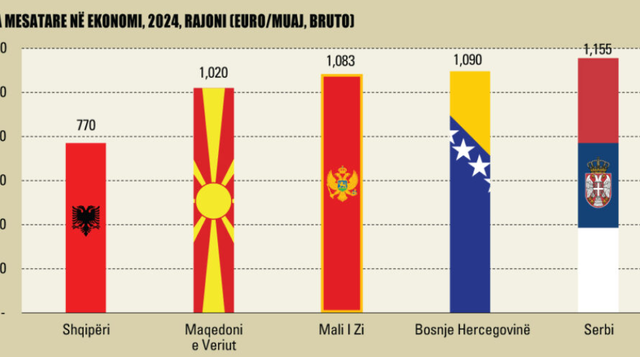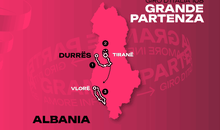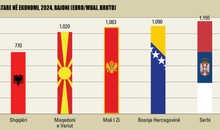
 Flash News
Flash News
The State Department overturns the women's ban: Berisha can come to America. What does it mean and why was the decision made a few days before May 11 / EXPLAINED
Search for 29-year-old in Klos, Kosovo comes to the rescue with a search and rescue contingent
The Tower of Silence, the 16-story building that challenges the law and community in the heart of Tirana
Accident on the Elbasan-Peqin axis, three police officers injured
Truck collides with ambulance, police: Nurse and patient's father among injured
The lost wage race, in Albania it will reach 770 euros in 2024, in the region it has exceeded 1000 euros/month

In Albania, the average gross monthly salary for 2024, according to INSTAT, reached 77.5 thousand lek/month, or about 770 euros.
Compared to a year earlier, wages increased by 9.8% in nominal terms, while the real increase, indexed to inflation, was 7.6%.
Compared to 2014 (the earliest year for which INSTAT has information), when it was 40.5 thousand lek, the salary in nominal value has increased by 70%, while indexed to inflation, the increase is reduced to 42.4%.
Wage growth rates have been stronger in the last two years, mainly influenced by administration salaries, following the government policy that used the budget to change the salary structure in public administration, in a race to equalize salaries with the region.
Despite this movement, the region has moved much faster in wage growth, according to data that Monitor compiled based on relevant statistical institutes. With the exception of Kosovo, wages in Albania remain about 30% lower than in other countries in the region.
The highest average gross monthly salary is in Serbia, at 1,150 euros per month (135,403 Serbian dinars). In Bosnia and Herzegovina, the salary is almost 1,100 euros (2,140 BAM). In Montenegro, the salary is 1,083 euros. North Macedonia also pays its employees more than a thousand euros per month on average, specifically 62,000 Macedonian dinars, or 1,020 euros per month.
The euro wage in Albania is artificially inflated due to the depreciation of the euro, while the real purchasing power of income in lek has decreased due to the continuous increase in prices over the last three years (6.7% in 2022, 4.8% in 2023 and 2.2% in 2024). If converted at the 2022 exchange rate, to avoid inflation, the average wage in the economy in 2024 was 650 euros, again 40% lower than the regional average.
Separate data for the private and public sectors are only available for Albania and Serbia. They show the “distortion” of the market in Albania, with a difference of 30%, while in Serbia, both the state and the private have the “power” to pay equally.
In Serbia, the private sector pays an average of 1,100 euros per month, while in Albania 690 euros, for the year 2024.
In Albania, at the beginning of 2022, the administration was paid on average 20% more than the private sector, while in the last quarter of 2024, the difference in salaries reached 30%. Even a tax action in the last months of 2024 to combat the informality of private sector salaries failed to encourage enterprises to pay their employees more.
The last three years have shown that wage increases by administrative order are destined to be a failed practice. The best way to increase wages in the economy is to increase productivity.
This means that salaries increase in line with improving employee skills and efficiency, bringing real benefits in production and higher profits for the company, rather than being administratively increased without any improvement in performance./ Monitor
Latest news



Rama attacks Bardhi: Fier cannot be represented by the world's gas
2025-05-07 22:36:22



EU calls on Israel to lift humanitarian blockade in Gaza
2025-05-07 21:42:34
"Russia is "asking for a lot"! Vance calls for direct Moscow-Kiev talks
2025-05-07 21:20:16





Bank of Albania sets limits on home loans, Sejko: The maximum will be 85%
2025-05-07 20:16:10


EP calls for immediate lifting of measures against Kosovo
2025-05-07 19:39:58





Accident on the Elbasan-Peqin axis, three police officers injured
2025-05-07 18:18:35


Durrës, a key mandate for the future majority is at stake
2025-05-07 17:34:00



Truck collides with ambulance, police: Nurse and patient's father among injured
2025-05-07 16:51:06
The SP MP and minister "join the DP", support Jorida Tabaku with two fingers up
2025-05-07 16:33:41


A dose of cocaine was found on him, the candidate for MP in Saranda was arrested
2025-05-07 16:02:52
Truck and ambulance collide on the Fier-Lushnjë axis, four injured
2025-05-07 15:51:13

4 ways to avoid spring viruses
2025-05-07 15:28:08
A weapons workshop was found in the north, Kosovo Police arrest one person
2025-05-07 15:13:40
Campaign Scandal: How Students Are Being Misused for Rama's Electoral Calendar
2025-05-07 15:08:07
Do elections affect the exchange rate?
2025-05-07 14:54:54
Election materials arrive in Lushnja and Divjaka
2025-05-07 14:40:15
The validity period for identity documents expiring by May 11 is extended
2025-05-07 14:29:25


3 public questions about Irena with 3 surnames
2025-05-07 13:50:35

44 reports of electoral crimes/ Tirana, Fier and Dibra lead in irregularities
2025-05-07 13:30:39
16-year-old Albanian boy goes missing in Northern Ireland
2025-05-07 13:21:25
Loneliness at a young age: Why young people feel more isolated than ever before
2025-05-07 13:13:27
Why did India attack Pakistan with missiles?
2025-05-07 12:56:49

Bebe Rexha confesses the pain that no one saw at the Met Gala
2025-05-07 12:34:39
Citizens protest for Vlora airport in front of the Supreme Court
2025-05-07 12:21:00
"Giro d'Italia", here are the road axes that will be blocked in Elbasan
2025-05-07 12:10:54
US support for family values, Vicky Hartzler supports Jonathan Panos
2025-05-07 11:58:08

Kosovo in political deadlock, attempt to constitute Parliament fails again
2025-05-07 11:31:51
45-year-old man arrested in Tirana, raped his wife and children, then shot them
2025-05-07 11:19:12
Disappearance of Jan Prenga, hearing postponed for Dritan Rexhepi and others
2025-05-07 11:10:46
BIRN: Tourism investments in Durres spark accusations of electoral gains
2025-05-07 10:59:10




DP closes campaign on May 9, Berisha: We conclude a journey, we begin a mission
2025-05-07 10:02:03
Doctors: 5% of children affected by asthma
2025-05-07 09:50:22
Document / Power of Attorney that "burys" Judge Irena Gjoka
2025-05-07 09:39:32

India attacks Pakistan with missiles, Trump reacts: It's a shame
2025-05-07 09:20:53
Foreign exchange/ How much foreign currencies are bought and sold today
2025-05-07 09:05:00

Mirditë/ Gjendet i mbytur në rezervuar 56-vjeçari
2025-05-07 08:47:03


Horoscope, what do the stars have in store for you today?
2025-05-07 08:03:23

Morning Post/ In 2 lines: What mattered yesterday in Albania
2025-05-07 07:34:47






Berisha-Rama: The burner that was never lit will burn your political career
2025-05-06 21:24:49
Berisha from Durrës accuses Sakos and Gjushi: Terrorists of the elections
2025-05-06 21:13:15

The election materials of May 11 also arrive in Lezha
2025-05-06 20:53:44
Serious Challenges to Providing Doctors in Rural Areas in Kosovo and Albania
2025-05-06 20:37:55



Two riders die in tragic accident during Superbike race at Oulton Park
2025-05-06 19:46:35

He parachuted in Himara, Police take action against Jonathan Islam
2025-05-06 19:30:33
100 days or 16 years?
2025-05-06 19:12:46




